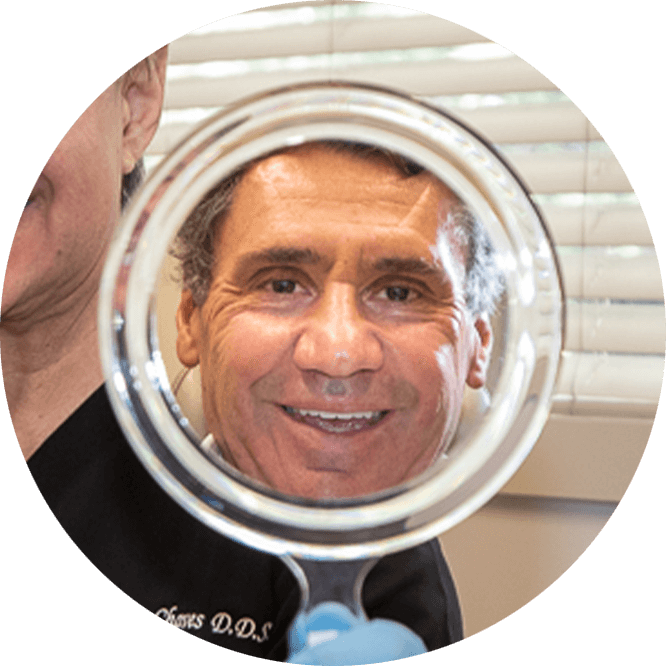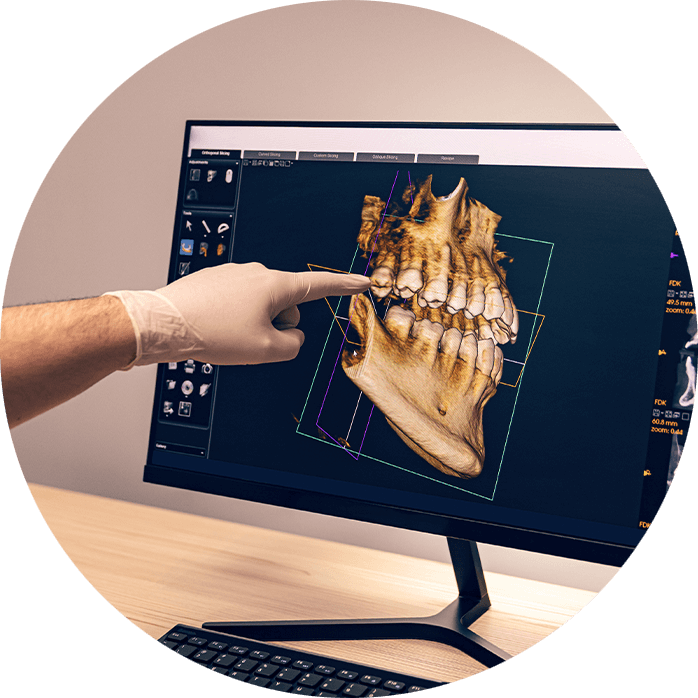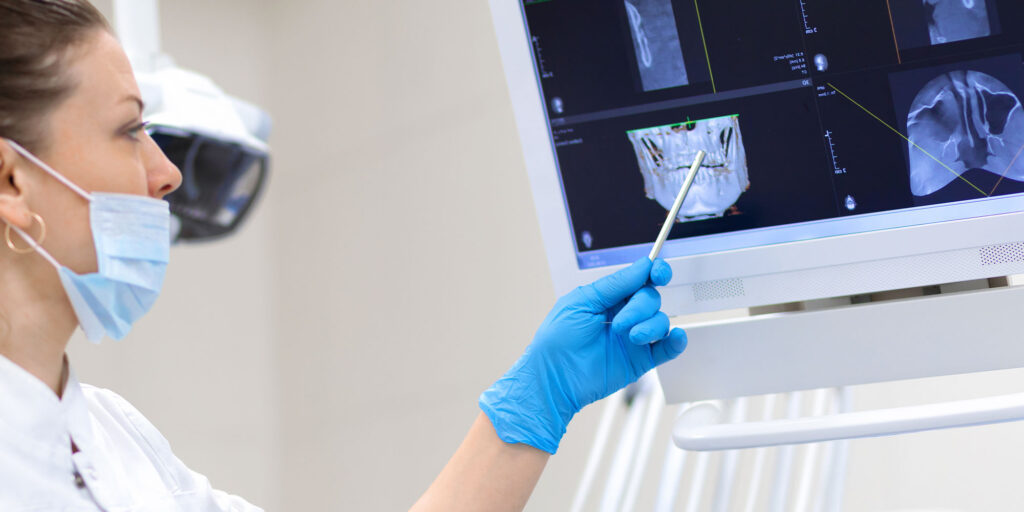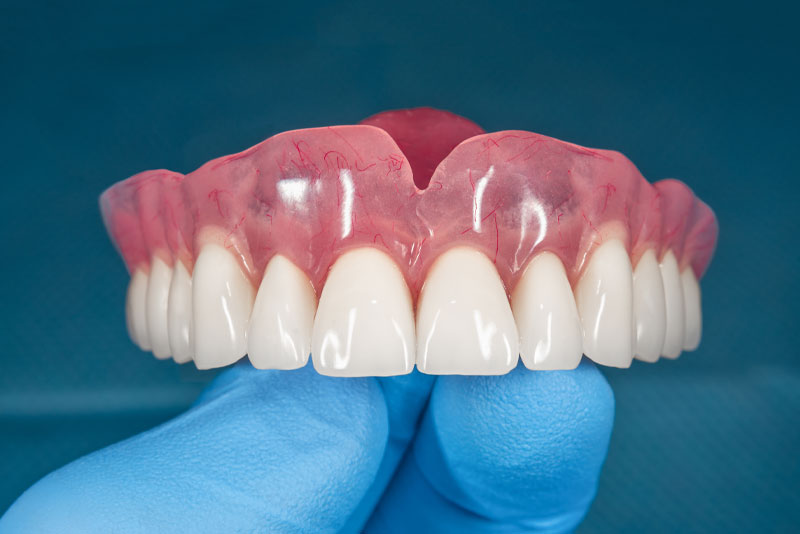


Relining dentures is a crucial step in maintaining the comfort, fit, and function of your dentures over time. Over the years, the shape and structure of your mouth change, causing dentures to fit less securely, which can lead to discomfort and even health issues. Changes in the gum line can significantly affect the fit of dentures, making relining essential to ensure they remain secure. Relining your dentures can restore their fit, extend their lifespan, and improve your overall oral health.
Make sure your dentures fit and are comfortable! You don’t want to deal with ill-fitting dentures. To reline your dentures, contact our Woodland Hills dentist today at 818-491-7294.
Denture relining is a process that involves reshaping the underside of your dentures to better fit the current contours of your mouth. When you first get dentures, they’re custom-fitted to your gums; however, as time goes on, your gums and jawbone can change due to bone resorption (bone loss), causing your dentures to become loose and uncomfortable. Relining helps fill in these gaps, restoring stability, comfort, and function.
The primary reason for denture relining is to adjust the fit after changes in the jawbone and gum tissue, which are especially common in the first few years after the loss of natural teeth. As your jawbone changes, your dentures become loose, making it harder to chew, speak, and maintain comfort.
Other reasons for relining include:

Individuals who possess the following qualities may qualify for snap-in dentures:
To determine what type of denture may work best for you, contact our Woodland Hills dentist today at 818-491-7294 to schedule an appointment.

Soft relines use a soft liner, a more flexible, softer material, to create a cushion between the gums and the denture base. Soft relines are especially beneficial for patients with tender or sore gums.
Pros of Soft Denture Reline:
Cons of Soft Denture Reline:
A hard reline involves reshaping the denture’s base with a hard resin material similar to the original denture base. This type of reline is durable and long-lasting, making it ideal for patients seeking a stable and strong fit.
Pros of Hard Denture Reline:
Cons of Hard Denture Reline:
A temporary reline, also known as a therapeutic reline, is often used when there is significant irritation, inflammation, or infection of the gums. This reline uses a medicated, soft material to help soothe the soft tissue of the gums and promote healing.
Pros of Temporary Denture Reline:
Cons of Temporary Denture Reline:
The first step involves a consultation with our dentist in Woodland Hills. This is especially important for those with new dentures to ensure a proper fit. They’ll examine your mouth, assess the fit of your dentures, and discuss the best reline option for your specific needs.
Our Woodland Hills dentist will remove a thin layer of material from the denture base, making room for the reline material. This step is essential to ensure that the new material bonds well and achieves the best fit.
Depending on the type of reline, our dentist will apply a layer of soft or hard reline material to the underside of the denture. The denture is then placed in your mouth to shape the material to the contours of your gums.
Once the material has been set, Dr. Chaves will smooth and polish the relined denture. The result should be a snug, comfortable fit that matches the current shape of your gums.
A snug fit provided by relining reduces the pressure on your gums, making it much more comfortable to wear your dentures daily.
Relining restores the stability of your dentures, making it easier to eat, talk, and engage in social activities without worrying about slippage.
Relining can improve both oral and overall health by preventing sores and irritation caused by loose dentures, which can lead to infections and other oral health issues if left unaddressed.
Regular relining can extend the life of your dentures, allowing you to delay the need for a new set. This can save you money in the long run by minimizing the need for repairs or replacements.
Most dentists recommend having dentures relined every 1 to 2 years, but this can vary based on individual needs and the type of reline used. Regular relining can help prolong the life of your dentures and maintain comfort and stability.
Relining is usually needed when you start noticing any of the following signs:
Well fitting dentures are crucial for comfort and functionality.
In the United States, the cost of soft relines typically ranges from $300 to $500, while hard relines generally cost between $200 and $450. Temporary relines are usually less expensive, costing around $100 to $200. The average costs vary depending on the type of reline you choose, with each option offering different benefits and longevity.
The lifespan of denture relines varies based on the type used and the care taken. Here’s a breakdown of the different types:
Cleaning relined dentures requires a gentle approach to avoid damaging the new material. Use a soft-bristled brush and avoid regular toothpaste, which can be too abrasive. Proper cleaning ensures the longevity and hygiene of your dentures, maintaining their comfort and functionality.
Avoiding denture adhesive immediately after a reline is crucial as it allows the new material to set and bond properly with the denture. Using adhesive too soon can disrupt the reline, leading to discomfort and a poor fit.
Regularly scheduled check-ups help assess the fit and make necessary adjustments, reducing the need for adhesives. Good oral hygiene and following post-reline care practices also contribute to a proper fit and comfort.
Denture relining usually takes one to two hours if done in-office, but some types may require sending the dentures to a dental lab, which can take a few days.
After relining, clean your dentures daily with a denture brush and mild soap or a denture cleanser. Avoid using abrasive cleaners or hot water, which can damage the material.
Most types of dentures can be relined, including partial and full dentures. However, some materials, like flexible dentures, may not be suitable for traditional relining.
While some may consider relining their dentures at home, professional assistance is generally recommended due to the potential risks and complications. Professional denture relines ensure optimal fit and comfort, utilizing specialized materials and techniques that are difficult to replicate at home. DIY relines can result in an improper fit, discomfort, and even damage to the dentures.
Denture relining is an essential aspect of denture maintenance that can significantly improve your comfort, oral health, and quality of life. If your dentures feel uncomfortable or don’t fit like they used to, it’s time to consider a denture reline. Schedule an appointment with our skilled dental team to find the best relining option for you. Whether you need a hard, soft, or temporary reline, we’re here to help you restore your comfort and confidence.
Denture wearers looking for relining services can contact our dentist in Woodland Hills today by calling 818-491-7294 for an appointment.


I understand the information disclosed in this form may be subject to re-disclosure and may no longer be protected by HIPAA privacy regulations and the HITECH Act.
